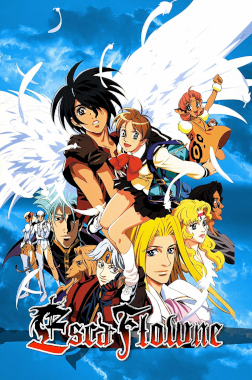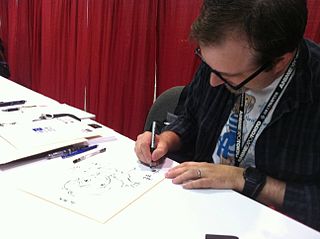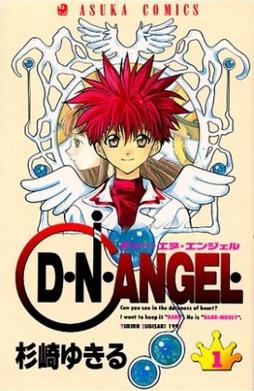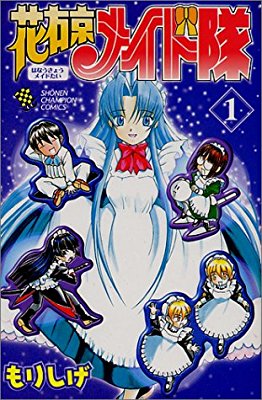
Megatokyo (メガトーキョー) is an English-language webcomic created by Fred Gallagher and Rodney Caston. Megatokyo debuted on August 14, 2000, and has been written and illustrated solely by Gallagher since June 17, 2002. Gallagher's style of writing and illustration is heavily influenced by Japanese manga. Megatokyo is freely available on its official website. The intended schedule for updates was for postings twice a week, but new comics are typically posted just once or twice a quarter on non-specific days. In 2011, updates began being delayed further due to the health issues of Sarah Gallagher (Seraphim), Gallagher's wife. Megatokyo was published in book-format by CMX, although the first three volumes were published by Dark Horse. For February 2005, sales of the comic's third printed volume were ranked third on BookScan's list of graphic novels sold in bookstores, then the best showing for an original English-language manga.

The Vision of Escaflowne is a Japanese anime television series created by Shōji Kawamori with Sunrise Studios and directed by Kazuki Akane. It premiered from April to September 1996, on TV Tokyo. Sony's anime satellite channel, Animax also aired the series, both in Japan and on its various worldwide networks, including Hong Kong, Taiwan, and Southeast Asia. It was licensed for Region 1 release by Bandai Entertainment. The series is currently licensed by Crunchyroll.

Astro Boy, known in Japan as Mighty Atom, is a Japanese manga series written and illustrated by Osamu Tezuka. It was serialized in Kobunsha's Shōnen from 1952 to 1968. The 112 chapters were collected into 23 tankōbon volumes by Akita Shoten. Dark Horse Comics published an English translation in 2002. The story follows Astro Boy, an android young boy with human emotions who is created by Umataro Tenma after the recent death of his son Tobio. Eventually, Astro is sold to a robot circus run by Hamegg, but is saved from his servitude by Professor Ochanomizu. Astro becomes a surrogate son to Ochanomizu who creates a robotic family for Astro and helps him to live a normal life like an average human boy, while accompanying him on adventures.

Frederick M. Gallagher III is an American illustrator and web cartoonist. He is best known as the artist, co-creator, and now full owner of Megatokyo. He also goes by the name of Piro, the main character of Megatokyo, who he has stated is an idealized version of himself when he was in college. He took this name from that of the cat in the visual novel Kanon.

D.N.Angel is a Japanese manga series written and illustrated by Yukiru Sugisaki. The manga premiered in Japan in the Kadokawa Shoten shōjo magazine Monthly Asuka in November 1997. After two extended hiatuses the series concluded in 2021. Kadokawa Shoten has collected the individual chapters and published them in 15 tankōbon and 5 e-books. The manga series is licensed for English language release in North America and the United Kingdom by Tokyopop, which has released 13 volumes of the series as of 2011.

Tokyopop is an American distributor, licensor and publisher of anime, manga, manhwa and Western manga-style works. The German publishing division produces German translations of licensed Japanese properties and original English-language manga, as well as original German-language manga. Tokyopop's US publishing division publishes works in English. Tokyopop has its US headquarters near Los Angeles International Airport in Los Angeles, California. Its parent company's offices are in Tokyo, Japan and its sister company's office is in Hamburg, Germany.

Top Cow Productions is an American comics publisher, an imprint of Image Comics. It was founded by Marc Silvestri in 1992.

Super Dimensional Fortress Macross II: Lovers Again is a six episode OVA in the Macross franchise. It was the first installment of Macross to feature a new cast of characters. Macross II was produced by Big West, with no involvement from the original series creators from Studio Nue or the original series animators from Tatsunoko Production.

Hanaukyo Maid Team is a Japanese manga series created by Morishige.

Vampire Princess Miyu is a Japanese horror manga series by Narumi Kakinouchi and Toshiki Hirano, as well as an anime adaptation by the same creators. The anime was originally adapted as a 4-episode original video animation (OVA) series released in 1988 and licensed by AnimEigo, and later as a 26-episode television series released in 1997 and licensed by Tokyopop and later Maiden Japan.

Seven Seas Entertainment is an American publishing company located in Los Angeles, California. It was originally dedicated to the publication of original English-language manga, but now publishes licensed manga and light novels from Japan, as well as select webcomics. The company is headed by Jason DeAngelis, who coined the term "world manga" with the October 2004 launch of the company's website.
An original English-language manga or OEL manga is a comic book or graphic novel drawn in the style of manga and originally published in English. The term "international manga", as used by the Japanese Ministry of Foreign Affairs, encompasses all foreign comics which draw inspiration from the "form of presentation and expression" found in Japanese manga. This may also apply to manga-inspired comics made in other languages.
VIZ Media, LLC is an American entertainment company headquartered in San Francisco, California, focused on publishing manga, and distribution and licensing Japanese anime, films, and television series.

Chibi Vampire, originally released in Japan as Karin, is a Japanese manga series written and illustrated by Yuna Kagesaki. The story is about an unusual vampiress girl, who instead of drinking blood must inject it into others because she produces too much. Chibi Vampire first premiered in the shōnen magazine Monthly Dragon Age in the October 2003 issue, and ran until February 2008. The individual chapters were published by Kadokawa Shoten into fourteen collected volumes. Later an anime series for "Chibi Vampire" was also produced in 2005. This anime series has a somewhat similar but different story and ending.
Ippongi Bang is a multimedia and manga artist,. She has been called "one of the most well-known manga artists in America in the mid-1990s."
Christy Lijewski is an American comic book artist and illustrator who specializes in OEL manga.

ASCII Media Works, formerly ASCII Media Works, Inc., is a Japanese publisher and brand company of Kadokawa Future Publishing headquartered in Nishi-Shinjuku, Shinjuku, Tokyo, Japan. It originally formed on April 1, 2008, as a result of a merger between ASCII Corporation and MediaWorks where MediaWorks legally absorbed ASCII. Despite this, the former president and CEO of ASCII, Kiyoshi Takano, became the first president and CEO of ASCII Media Works. It became an internal division of Kadokawa Corporation on October 1, 2013.

Shonen Jump, officially stylized SHONEN JUMP and abbreviated SJ, was a shōnen manga anthology published in North America by Viz Media. It debuted in November 2002 with the first issue having a January 2003 cover date. Based on Shueisha's popular Japanese magazine Weekly Shōnen Jump, Shonen Jump was retooled for English readers and the American audience, including changing it from a weekly publication to a monthly one. It featured serialized chapters from different manga series and articles on Japanese language and culture, as well as manga, anime, video games, and figurines. The premiere issue of Shonen Jump also introduced the first official English translations of One Piece, Sand Land, Yu-Gi-Oh!, YuYu Hakusho, and Naruto.

Ms. Vampire Who Lives in My Neighborhood is a Japanese four-panel manga series by Amatou. It has been serialized since August 2014 in Media Factory's seinen manga magazine Comic Cune, which was originally a magazine supplement in the seinen manga magazine Monthly Comic Alive until August 2015. It was collected in eight tankōbon volumes. An anime television series adaptation by Studio Gokumi and AXsiZ aired between October and December 2018.















